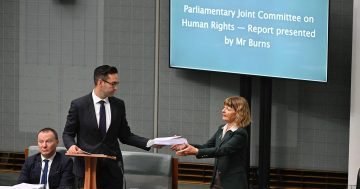
ACT Human Rights Commissioner Helen Watchirs says that reliance of delegated legislation warrants increased scrutiny. Photo: Supplied.
The ACT Government has said it will consider the 15 recommendations from the pandemic committee, which has called for more transparency on how compatible new health measures are with human rights.
The second interim report from the tri-partisan Select Committee on the COVID-19 pandemic response was presented to the ACT Legislative Assembly on Thursday (4 June) by its chair, Alistair Coe.
The interim report recommends that ACT Policing, ACT Health and Access Canberra publish weekly, de-identified data about compliance activities that take place under public health emergency directions.
These activities include the number of infringement notices or cautions issued by officers, how many compliance checks they conducted, and the basic socio-demographic indicators of people or businesses.
To date, ACT Policing has issued no fines for breaching social distancing measures.
In the ACT, the Chief Health Officer is granted special powers during a health emergency that allows them to restrict the travel and gathering of individuals without the directions needing to pass through the Assembly.
Normally, bills that are presented to the Assembly must detail possible infringements and incompatibilities with the ACT Human Rights Act.
The ACT Human Rights Commission’s submission to the Committee says that the increased reliance of delegated legislation (laws not made by the Assembly) in the context of a public health emergency should warrant increased scrutiny.
“By its nature, emergency legislation, including delegated legislation, being made rapidly in response to the COVID-19 pandemic is likely to engage human rights,” the submission says.
“A human rights-based approach in a public emergency context requires that such laws and preventative measures be accountable to considered and responsive scrutiny mechanisms.
“Human rights scrutiny is especially essential where delegated legislation determines the content of obligations that attract fines or potential imprisonment for non-compliance.”
The ACT Government says it will consider any potential human rights breaches very seriously if they arise.
“This unprecedented health and economic emergency will continue to be felt in our community for many years,” an ACT Government spokesperson said.
“Given the likely long-term impacts of the pandemic on our community, we will continue to monitor the situation in determining if changes are required to the way in which emergency legislation and its associated functions are presented, introduced or enacted.”
Region Media understands that the Chief Health Officer has been receiving briefings about potential human rights conflicts in regards to new directions.
Human rights were taken into consideration when deciding where the 200 arrivals from India would undergo their mandatory quarantine – making sure that rooms had access to balconies and kitchenettes – and people who could safely quarantine at home were allowed to do so.
But the Committee recommended that a statement of compatibility with human rights be presented to the Assembly with all delegated legislation.
Delegated legislation should also be presented to the Assembly where it can be vetoed or disallowed for a set period of time, as opposed to just being notified, the Committee said.





















